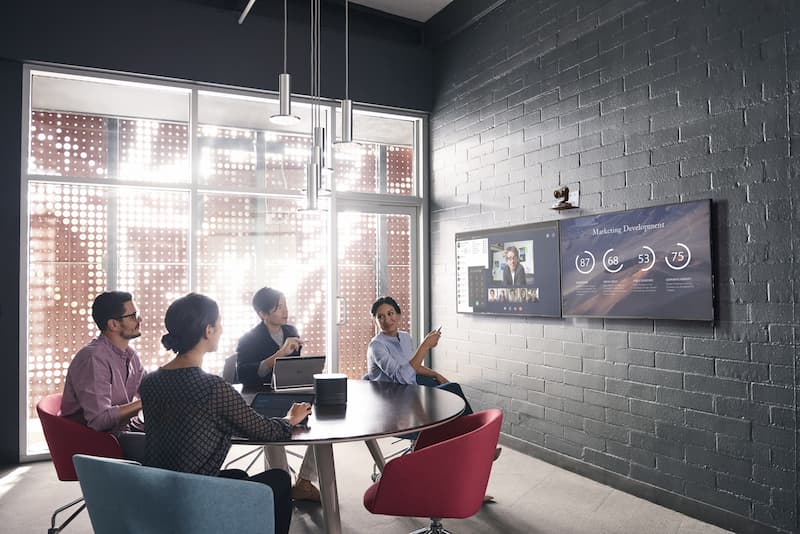
McCambridge Duffy spart fast eine halbe Million Pfund pro Jahr durch die Zusammenarbeit mit Apogee
12 February 2024
Sie wollen mehr Datensicherheit? Investieren Sie in ein reibungsloseres hybrides Arbeiten
12 February 2024
Einfaches hybrides Arbeiten: Der Schlüssel zur Mitarbeiterbindung
Die Loyalität der Mitarbeiter ist in der modernen Unternehmenslandschaft wichtiger denn je - aber die Personalleiter scheinen zu zögern, in Instrumente zu investieren, die die Work-Life-Balance tatsächlich verbessern würden, obwohl dies eine der wichtigsten Forderungen der Mitarbeiter ist.
In der modernen Unternehmenslandschaft war es für Arbeitgeber noch nie so wichtig wie heute, Talente anzuziehen und zu halten - vor allem, wenn man bedenkt, dass allein in Großbritannien 300.000 Stellen mehr frei sind als noch Anfang 2020.
In einer kürzlich von Apogee durchgeführten Studie gaben beunruhigende 40 % von 200 Mitarbeitern an, dass sie bereit sind, ihre derzeitige Position zu verlassen, um sich anderen Möglichkeiten zuzuwenden - der Hauptgrund dafür ist der fehlende Zugang zu digitalen Tools für die Zusammenarbeit.
Personalleiter mögen dies für eine unangemessene Forderung der Mitarbeiter halten, insbesondere wenn man bedenkt, wie sehr sie sich auf die Herausforderungen des Jahres 2020 eingestellt haben. Die Untersuchungen scheinen jedoch darauf hinzudeuten, dass die Mitarbeiter negative Auswirkungen erleben, weil weiterhin zu wenig in Tools investiert wird, die die hybride Zusammenarbeit erleichtern.

Mehr als ein Viertel unserer Stichprobe (28 %) gab beispielsweise an, dass ein Mangel an angemessener Technik sie daran hindert, ihre Arbeit richtig zu erledigen. Viele berichteten über Gefühle der Frustration (29 %) und Isolation (28 %) als direkte Folge davon.
Doch obwohl Flexibilität eine der wichtigsten Forderungen der Arbeitnehmer ist, sind sich 20 % der 200 Personalleiter nicht sicher, wie sie diese Bedürfnisse erfüllen können - 76 % gehen sogar so weit, sie als "einfach unvereinbar mit den Bedürfnissen des Unternehmens" zu bezeichnen. Und das, obwohl fast ein Drittel dieser Personalleiter die Vereinbarkeit von Beruf und Privatleben (32%) als wichtigstes Merkmal des idealen Arbeitsplatzes nennt.
Hier sehen wir eine klare Diskrepanz in Bezug auf die Prioritäten - während die Vereinbarkeit von Beruf und Privatleben anerkanntermaßen eine Priorität ist, halten viele die Investition in besseres hybrides Arbeiten für eine zu große Hürde. Aber warum ist das so, und wie können Personalleiter davon überzeugt werden, dass Collaboration-Technologien entscheidend sind, um ihre wertvollen Talente zu halten?
Das Spiel der Generationen spielen
Natürlich ist dies nicht die einzige Diskrepanz, mit der die Personalleiter zu kämpfen haben. Beachtliche 18 % der Personalleiter geben an, dass sie Schwierigkeiten haben, mit ihren Mitarbeitern in Kontakt zu treten, insbesondere mit den Angehörigen der Generation Z - Digital Natives, die erst während der Pandemie in die Arbeitswelt eingetreten sind und es vorziehen, digital zu kommunizieren, und die erwarten, dass eine nahtlose hybride Zusammenarbeit bereits vorhanden ist.

Die Personalverantwortlichen unterschätzen jedoch den Einfluss, den die richtige Technologie auf die Mitarbeiterbindung haben kann. Sie rangieren damit weit abgeschlagen an vierter Stelle hinter der Work-Life-Balance (40 %), der Karriereentwicklung (28 %) und dem hybriden Arbeiten (27 %). Im Gegensatz dazu nennen 24% der Arbeitnehmer die Technologie für die Zusammenarbeit als ihre oberste Priorität für einen idealen Arbeitsplatz.
Diese Diskrepanz könnte zum Teil darauf zurückzuführen sein, dass Personalleiter mehr Wert auf physische Interaktionen im Büro legen als jüngere Generationen. Für 23% der Befragten verhindert weniger Zeit von Angesicht zu Angesicht, dass sie sich mit ihren Mitarbeitern verbunden fühlen. Aber durch ihr Zögern, der jüngsten Generation auf halbem Wege entgegenzukommen, vergrößern die Personalleiter nur die Kluft zwischen sich und ihren jüngsten Kollegen.
Das ist etwas, das sich Arbeitgeber offensichtlich nicht leisten können. Fast ein Viertel (23 %) der Personalverantwortlichen gab an, dass die aktuellen Herausforderungen im Zusammenhang mit der Personalbeschaffung und -bindung bereits der häufigste Faktor sind, der sie daran hindert, die Zukunft der Arbeit optimistisch zu sehen - und je länger diese Diskrepanz unkontrolliert bleibt, desto länger werden sich die negativen Gefühle verfestigen müssen.
Mitarbeiter auf halbem Weg treffen
Hybrides Arbeiten wird es immer geben - und da sich die Technologie so schnell weiterentwickelt, werden Tools für die digitale Zusammenarbeit früher oder später zum Alltag in Unternehmen gehören. Wenn Sie sich jedoch proaktiv darauf einlassen, können Sie die Kosteneffizienz in Ihrem Unternehmen steigern, indem Sie die Arbeitszeit Ihrer Mitarbeiter besser ausnutzen und gleichzeitig die Work-Life-Balance verbessern, an die sich Ihre Mitarbeiter gewöhnt haben.

Um eine funktionellere hybride Arbeitskultur für ihre Mitarbeiter zu fördern, müssen Personalleiter ihre Vorstände für die Vorteile einer effektiven digitalen Zusammenarbeit sensibilisieren - und auch selbst den Wert der virtuellen Interaktion erkennen, anstatt sie als vorübergehende Modeerscheinung abzutun, die bei den jüngeren Generationen beliebt ist. Im Folgenden finden Sie einige Beispiele für die Vorteile, die Sie sich entgehen lassen:
- Ein Informationsmanagementsystem ist von unschätzbarem Wert, wenn es darum geht, Dokumente einfach zu finden, freizugeben, zu sichern, zu sichern und von jedem beliebigen Ort aus zu öffnen. Es ermöglicht Ihren Mitarbeitern an anderen Standorten nicht nur den einfachen Zugriff auf die benötigten Dateien, wenn sie sie brauchen, sondern gibt Ihnen auch Werkzeuge an die Hand, mit denen Sie sensible Dateien vor internen und externen Bedrohungen der Datensicherheit schützen können.
- Anstatt Ihre Mitarbeiter mit geringwertigen manuellen Aufgaben zu belasten, übernimmt die Software zur Prozessautomatisierung bestimmte Verwaltungsaufgaben (z. B. die Rechnungsbearbeitung), ohne dass die Mitarbeiter dafür Ressourcen benötigen. So können sie sich in der Zeit, in der sie nicht im Büro sind, verstärkt wertvollen strategischen Aufgaben widmen.
- Sorgen Sie für eine effektive Kommunikation - und damit für eine effektivere Zusammenarbeit - mit einem Meetingraum-Ausstattungsservice. Dies fördert nicht nur die psychische Gesundheit, da sich die Mitarbeiter mit ihren Kollegen besser verbunden fühlen, sondern erleichtert auch eine effektivere, koordinierte Teamarbeit, selbst wenn die Mitarbeiter aus der Ferne arbeiten.
Letztlich ist ein Unternehmen nichts ohne seine Mitarbeiter. Wenn Sie nicht aktiv in die Bereicherung des Mitarbeitererlebnisses investieren, vergraulen Sie nur die Talente. Personalleiter sind eine wichtige Stimme, die das Engagement und den Einsatz der Mitarbeiter für ihr Unternehmen aufrechterhalten kann - aber nur, wenn sie neuen Arbeits- und Kommunikationsmethoden gegenüber aufgeschlossen sind und wenn sie bereit sind, sich bei der Unternehmensleitung für die Interessen ihrer Mitarbeiter einzusetzen.
Für weitere Informationen laden Sie bitte das untenstehende eBook herunter.















































 Chief Information Officer
Chief Information Officer Chief People Officer
Chief People Officer Leiter der Finanzabteilung
Leiter der Finanzabteilung VP für laufendes Geschäft und Dienstleistungsumsatz
VP für laufendes Geschäft und Dienstleistungsumsatz